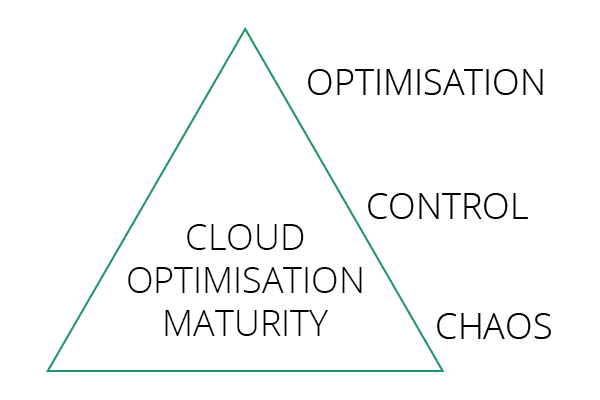Why Optimise Cloud Deployments?
By Team Arrk |
|
5 mins read |

It only makes sense that creating best practices and cost-effective systems increases the likelihood of business success. So why not apply this same thought process to Cloud deployment?
Why is optimising Cloud deployments so important?
Have you noticed increased reliance on the Cloud as part of your business? If so, then you’re certainly not alone – 2017 has very much been the year in which the Cloud has exploded and the key players within the market are all attempting to grab more business.
In turn, organisations are seeing cloud deployments as the default environment for new systems and migrations from existing on-premise or co-located systems. Furthermore, some organisations are also moving development activities to the cloud.
So, isn’t this a good thing?
Of course, the increased emphasis on the Cloud is generally positive for businesses – but it can create inefficiencies too. That’s because, in most cases, the switch to the Cloud has been quite organic and businesses have been carrying out cloud deployments without sufficient awareness of building solutions in a cloud environment, disaster recovery, scale, high availability and cost management. The net result is that organisations do not receive maximum benefit from the cloud.
While the pros of utilising the Cloud may generally outweigh those of a more traditional deployment, the perception of these advantages can be held back if a Cloud is seen as more time consuming, more expensive or, in worst case scenarios, if the inefficiencies it causes actually harm the user experience and ultimately your reputation
Are there best practices you can follow with Cloud deployment?
There are many best practices you can employ with the Cloud that will enhance overall deployment. These include:
Capacity
One of the major advantages of the Cloud is that you can easily scale your system up and down to minimise cost. Don’t sit on idle resources that add unnecessary expense.
Test production
The Cloud provides a platform on which you have a production-scale environment for testing – so use it. It will mean you’re simulating the live environment for just a fraction of the cost as you can easily turn off test systems when not in use.
Automate
With the Cloud, you should look to make the most of automation, allowing you to replicate architectures for considerably less cost and effort. It will also allow you to track changes while auditing and assessing their impact.
Track data
The Cloud allows you to track data so you can make decisions based around it. Over time, utilising that data can lead to further efficiencies and improve your choices.
How do you go about further optimising Cloud deployment?
There are five broad areas in which Cloud deployment can be optimised, according to Amazon Web Services (AWS) – those being: security, reliability, performance efficiency, cost optimisation and operational excellence. However, there isn’t simply a “one size fits all”, fool-proof approach to maximising these areas – instead it’s about making trade-offs to suit the context of your business – for example, when developing you might wish to maximise cost efficiencies at the expense of reliability, but when providing an e-commerce solution, performance is likely to be the key driver because it is so important to customers and their buying decisions.
However, there isn’t simply a “one size fits all”, fool-proof approach to maximising these areas – instead it’s about making trade-offs to suit the context of your business – for example, when developing you might wish to maximise cost efficiencies at the expense of reliability, but when providing an e-commerce solution, performance is likely to be the key driver because it is so important to customers and their buying decisions.
Here is a summary of each area:
Security
It’s vital to control who can do what before putting practices into place. You’ll need to be able to quickly identify any security issues, while also having clear processes in place to respond to any incidents that do occur to limit financial loss. Therefore, you should be looking for a mix of detective controls, data and infrastructure protection, and incident response.
Reliability
How quickly can the system recover from a disruption and mitigate it? This will be vital to the perception of your business and there are several principles that can boost reliability, including: clear test recovery procedures, setting up triggered automated recovery when thresholds are breached; and closely managing any changes.
Performance Efficiency
Can you maintain efficiency as demand evolves? The Cloud opens up this possibility because instead of having an IT team learn many new principles it can provide new technologies such as machine learning, NoSQL databases and media transcoding as part of a service, clearing your team to focus on product development.
The Cloud also offers advantages in terms of the ability to globalise your systems, run server-less architectures and experiment quickly. To enjoy these the Cloud also offers advantages in terms of the ability to globalise your systems, run server-less architectures and experiment quickly.
To enjoy these advantages however, you’ll need to appropriately select a system, monitor it and make the necessary trade-offs – such as space versus time, to enjoy higher performance.
Cost Optimisation
Remember this is about the lifecycle of the system and continuous refinement. The Cloud allows you to stop spending on data centres and to pay only based on consumption – but you need to optimise this by being aware of your expenditure, choosing cost-effective resources and matching supply with demand.
Operational Excellence
The Cloud can drive operations by performing them with code, allowing you to make minor changes, respond quickly to unexpected events and, most importantly, align processes with your business goals. However, for this to be maximised you’ll need to design workflows thoroughly, evolve them over time and ensure your team is able to quickly respond to failures and learn from them.
This is, of course, just an overview of why optimising cloud deployment is vital – to implement these strategies consider turning to Arrk’s consultants who can review your business individually to help you implement a cloud optimsation strategy that works for you.










